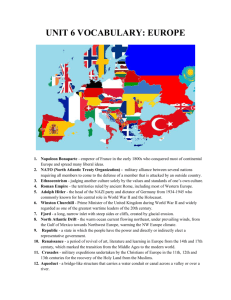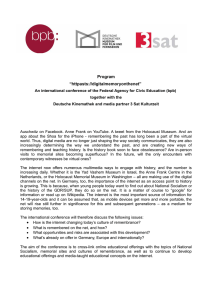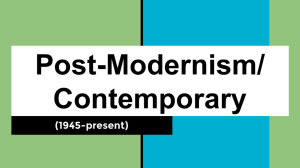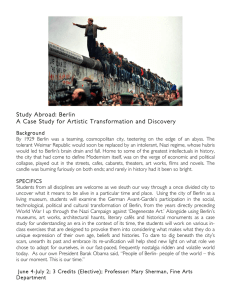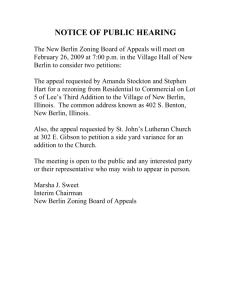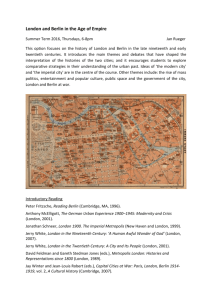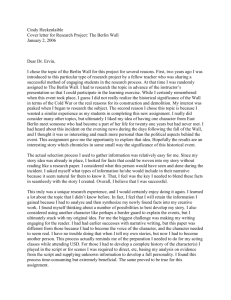3 International Conference on Holocaust Research Helpers, Rescuers and Networkers of Resistance
advertisement
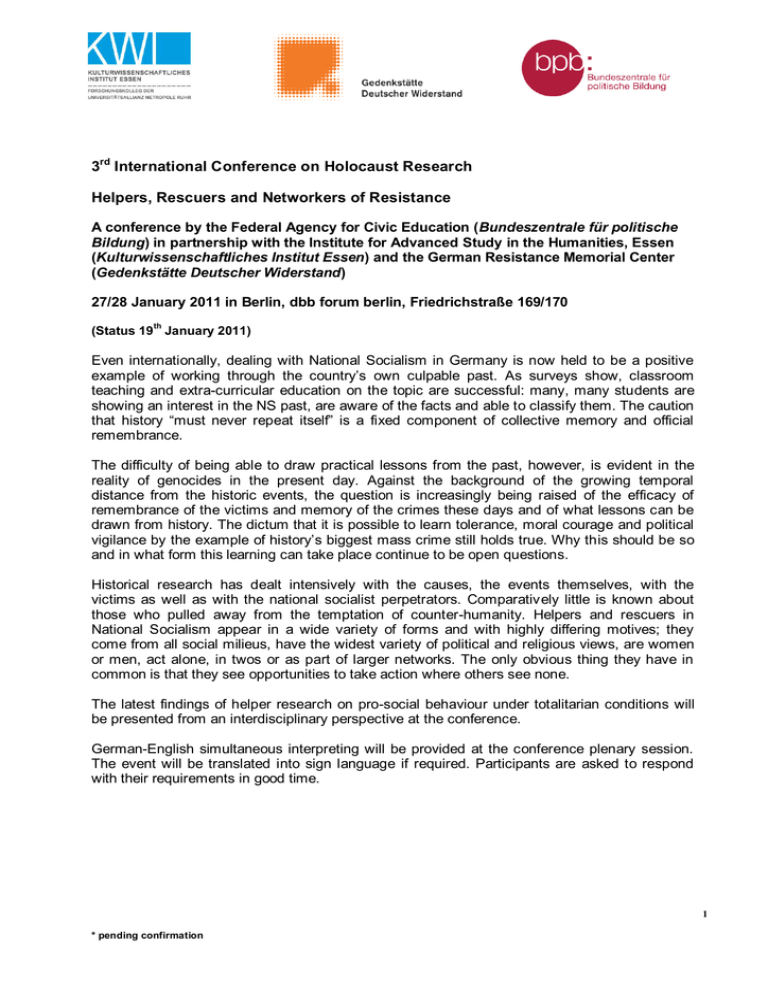
3rd International Conference on Holocaust Research Helpers, Rescuers and Networkers of Resistance A conference by the Federal Agency for Civic Education (Bundeszentrale für politische Bildung) in partnership with the Institute for Advanced Study in the Humanities, Essen (Kulturwissenschaftliches Institut Essen) and the German Resistance Memorial Center (Gedenkstätte Deutscher Widerstand) 27/28 January 2011 in Berlin, dbb forum berlin, Friedrichstraße 169/170 th (Status 19 January 2011) Even internationally, dealing with National Socialism in Germany is now held to be a positive example of working through the country’s own culpable past. As surveys show, classroom teaching and extra-curricular education on the topic are successful: many, many students are showing an interest in the NS past, are aware of the facts and able to classify them. The caution that history “must never repeat itself” is a fixed component of collective memory and official remembrance. The difficulty of being able to draw practical lessons from the past, however, is evident in the reality of genocides in the present day. Against the background of the growing temporal distance from the historic events, the question is increasingly being raised of the efficacy of remembrance of the victims and memory of the crimes these days and of what lessons can be drawn from history. The dictum that it is possible to learn tolerance, moral courage and political vigilance by the example of history’s biggest mass crime still holds true. Why this should be so and in what form this learning can take place continue to be open questions. Historical research has dealt intensively with the causes, the events themselves, with the victims as well as with the national socialist perpetrators. Comparatively little is known about those who pulled away from the temptation of counter-humanity. Helpers and rescuers in National Socialism appear in a wide variety of forms and with highly differing motives; they come from all social milieus, have the widest variety of political and religious views, are women or men, act alone, in twos or as part of larger networks. The only obvious thing they have in common is that they see opportunities to take action where others see none. The latest findings of helper research on pro-social behaviour under totalitarian conditions will be presented from an interdisciplinary perspective at the conference. German-English simultaneous interpreting will be provided at the conference plenary session. The event will be translated into sign language if required. Participants are asked to respond with their requirements in good time. 1 * pending confirmation Agenda Thursday, 27 January 2011 From 8.30 a.m. Registration The hour of remembrance for victims of National Socialism at the German National Parliament will be broadcast live by Phoenix between 9.00 a.m. and 10.00 a.m. 11:00 a.m. Welcome Thomas Krüger, President of the Federal Agency for Civic Education 11:15 a.m. Opening Thomas de Maizière, German Interior Minister 11:45 a.m. Opening Presentation Ladislaus Löb (em.), University of Sussex in Brighton/ Author of the book, “Dealing with Satan” 12:45 a.m. Coffee break 1:00 p.m. Introductory Presentations “What Makes a Helper: Theory and Findings of Interdisciplinary Helper Research” Harald Welzer, Institute for Advanced Study in the Humanities, Essen “The Ignored Resistance: Development and Perspectives of Helper Research” Johannes Tuchel, German Resistance Memorial Center, Berlin 2:00 p.m. Lunch 3:30 p.m. Panel: Assistance to Jews during the Holocaust – Germany “Where One Would Least Expect It… Opportunities to Take Action for Rescuers in the Wehrmacht’s War of Extermination” Wolfram Wette, University of Freiburg “Possibilities and Limitations of Helper Research Today - Sources and Questions” Barbara Schieb, Silent Heroes Memorial Center, Berlin “The Fate of the Helpers after 1945” Dennis Riffel, Gegen Vergessen- Für Demokratie e.V., Berlin Moderation: Christian Gudehus, Institute for Advanced Study in the Humanities, Essen Discussion 2 * pending confirmation 6:00 p.m. reception, and to follow Concert with Avri Levitan and Yael Kareth Programme: Oedoen Partos Yiskor - in memoriam Max Bruch Kol Nidrei Ernst Bloch Suite Hebraique Brahms 2nd Clarinet/Viola Sonata Friday, 28 January 2011 10:00 a.m. Welcome and Introduction to the Day’s Agenda 10:15 a.m. Panel: Assistance for Jews during the Holocaust – Europe “Assistance for Jews in Eastern Europe with a Focus on Poland” Beate Kosmala, Silent Heroes Memorial Center, Berlin “The Rescue and Survival of Jews in Occupied Western Europe – A Reappraisal Sound” Bob Moore, University of Sheffield “On the Rescue of Jews by Spanish Diplomats: Myth, Facts and Remembrance Policy” Alejandro Baer, University of Bayreuth “The Righteous among the Nations - Yad Vashem’s Unique Project” Irena Steinfeldt, Yad Vashem Remembrance Authority, Jerusalem Moderation: Ina Boesch, Cultural studies researcher and publicist, Berlin Discussion 12:00 Lunch (at your free disposal) 1:00 p.m. Panel: Assistance under Restrictive Conditions – Interdisciplinary Access Points “Strangers and Friends: the Significance of Existing and Newly Created Social Relationships for the Survival of the Persecuted and their Helpers” Marten Düring, Institute for Advanced Study in the Humanities, Essen “Swords or Shields? Implementing and Subverting the Final Solution in German-occupied Europe” Ethan Hollander, Wabash College, Crawfordsville, Indiana “Helpers’ Conference in Rwanda – Rescue Experiences between Social Recognition, Political Indifference and Court Conviction” Gerd Hankel, Hamburg Institute for Social Research 3 * pending confirmation “Between Love for the World and Political Responsibility: Saying No in a Dictatorship” Natan Sznaider, Academic College of Tel-Aviv Moderation: Mark Roseman, Indiana University Bloomington 3:00 p.m. Coffee break 3:30 p.m. Round table: “What does it have to do with us?” Moral courage as a lesson from the past Marcus Appelbaum, U.S. Holocaust Memorial Museum, Washington D.C. Susanne Beer, Institute for Advanced Study in the Humanities, Essen Deidre Berger, American Jewish Committee, Berlin Reinhard Kahl, journalist and filmmaker, Hamburg Christian Nürnberger, author Moderation: Silvia Fehrmann, Haus der Kulturen der Welt, Berlin 5:00 p.m. Farewell 4 * pending confirmation 29 January 2011 in Berlin, dbb forum berlin, Friedrichstraße 169/170 Saturday, 29 January 2011 Agenda Practice forum: Learning Moral Courage The practice forum, “Learning Moral Courage” will be taking place after the close of the 3rd International Conference on Holocaust research “Helpers, Rescuer and Networkers of Resistance”. Both German and European case studies in citizenship education will be presented here. The aim of the practice forum will be to render visible the significance of prosocial behaviour in the present day, to highlight opportunities to take action and to promote awareness of these. Examples will be provided to show how moral courage can be promoted and expressed today. Different spheres of activity on the topic of moral courage will be discussed at the practice forum in the context of citizenship education’s tasks. 9:30 a.m. Welcome Introductory Presentations “The Lucifer Effect and Heroes of Good Deeds” Philip George Zimbardo, Stanford University Discussion “On the History Didactics of Pro-social Behaviour under Totalitarian Conditions” Alfons Kenkmann, University of Leipzig Discussion 12:00 Lunch 1:00 p.m. - 3.00 p.m. Parallel workshops Learning Moral Courage – Presentation and Discussion of Case Studies Workshop 1: Opportunities to take action in the public institutions as a topic of historicocivic education Introduction and moderation: Ulla Kux, Stiftung „Erinnerung, Verantwortung, Zukunft”, Berlin 5 * pending confirmation Case studies: Historico-civic education with the police based on the example of the Holocaust Museum in Washington Marcus Appelbaum, United States Holocaust Memorial Museum “Human Rights Education, Institutions, NS History” Oliver von Wrochem, Neuengamme Concentration Camp Memorial Site, Hamburg Workshop 2: "Profession: none"– Women as Escape Helpers under National Socialism. Gender-reflected Approaches in Citizenship Education Work Introduction and moderation: Angelika Meyer, Aktives Museum Faschismus und Widerstand in Berlin e.V. / Mahn- und Gedenkstätte Ravensbrück Case studies: Angelika Meyer Gender and Prevention of Right-Wing Extremism. Experiences from the Model Project “Lola für Lulu” by the Amadeu Antonio Foundation Heike Radvan Workshop 3: “What does this have to do with me?” – Historico-civic education in immigrant society Introduction and moderation: Franziska Ehricht, Miphgasch/Begegnung e.V., Berlin Case studies “Sharing Histories” – A document case for intercultural pedagogy on National Socialism Franziska Ehricht Schöneberg Young People’s Museum: History Laboratory: 1933 – 1945 mobile Petra Zwaka Workshop 4: Film in historico-civic educational work Introduction and moderation: Yaakov Kabalek, University of Virginia Critical dealing with the use of movies in historico-civic educational work Case study: Material on the film “Schindler’s List” – Jewish Museum Frankfurt Martin Liepach, Fritz Bauer Institute, Frankfurt am Main 6 * pending confirmation Workshop 5: New media and innovative access points Introduction and moderation: Kai J. Jonas, University of Amsterdam Case studies: “Visual and Behavioural Fidelity of Virtual Humans with Applications to Bystander Intervention in Violent Emergencies” Claire Campbell, University of Lancaster “Witnesses of the Shoah. The Visual History Archive in School Education” Isabel Enzenbach, Bernd Körte-Braun, Dorothee Wein, FU Berlin W7 x jung – Your Training Place for Solidarity and Respect. The Unusual Exhibition on Showing your Face! For a Cosmopolitan Germany” Jan Krebs Workshop 6: Dealing with helpers during National Socialism in citizenship education at school Moderation: N.N. Case studies: “Let’s talk about freedom“ Iga Kazimierczyk, Center for Citizenship Education, Warsaw* “Welcome to Britain” Anna Levy, Keystage Arts Company, Cambridge „,…und nicht zuletzt Ihre stille Courage' – Hilfe für Verfolgte in Hamburg 1933–1945" Frauke Steinhäuser, Hamburg Workshop 7: Transnational projects and memorial site work Introduction and moderation: Matthias Hass, Political scientist, Berlin Case studies: “Righteous Among the Nations“ Paulina Maloy, Edith Stein Society, Wroclaw “Moral Courage Back Then – Moral Courage Today: Followers, Spectators. Those Who Look Away...” Helmut Rez, Dachauer Forum e.V. “Violation of Human Rights of Jews Before the First Massive Executions. The Role of bystanders“ Ingrida Vilkiene, International Commission fort the Evaluation of the Crimes of the Nazi and Soviet Occupation Regimes in Lithuania 7 * pending confirmation 3.00 p.m. Discussion of the workshops in plenary session Farewell From 4.15 p.m. we offer you an optional and self-organized programme of visits to various institutions and memorial sites in Berlin. Museum Otto Weidt’s Workshop for the Blind This permanent exhibition tells the story of Otto Weidt’s Workshop for the Blind at the authentic location. In his brush workshop during the Second World War, Weidt employed mainly blind and deaf Jews whom he tried to protect from persecution and deportation. He successfully hid a number of them. Introduction to the content-related concept of the Museum Otto Weidt’s Workshop for the Blind, followed by a guided tour and discussion with contemporary witness Inge Deutschkron. She is Chair of the funding association Blindes Vertrauen e.V. (Blind Trust) Silent Heroes Memorial Center This memorial site provides remembrance of those who helped persecuted Jews during National Socialism. The permanent exhibition gives information about the persecution and plight of Jews in the face of imminent deportations, about the decision by individuals among them to flee underground, as well as about the conduct and motives of their helpers. Introduction to the content-related concept of the memorial site Stille Helden, followed by a guided tour through the exhibition. Anne Frank Zentrum Berlin The diary and life story of Anne Frank are at the focus of the centre’s permanent exhibition. Via listening terminals and short portrait films we also hear from young Berliners, confronting current issues and producing a link with the present time. 7x jung – Your Training Place for Solidarity and Respect – The Unusual Exhibition on Showing your Face! The artistic exhibition 7x jung thematizes experiences of marginalization, anti-Semitism and discrimination and shows what can be done against them. In seven topical spaces, life worlds from today are portrayed by young people and personal, emotional and sensory accesses to the National Socialist period are gained. 8 * pending confirmation
